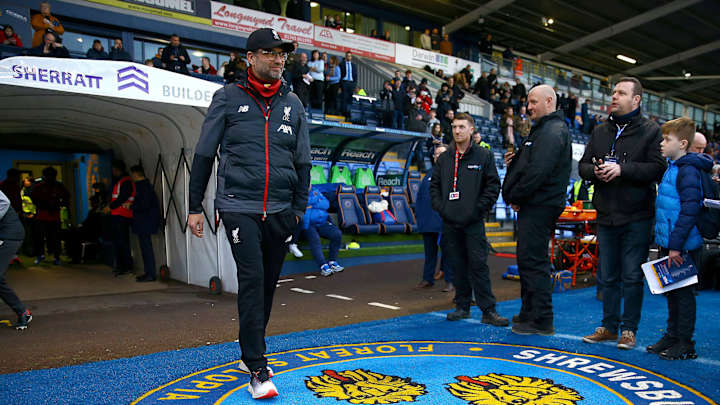It's Hard to Blame Jurgen Klopp for Liverpool's FA Cup Replay Stance

Jurgen Klopp is bracing for a holiday in February.
The FA told him there would be a winter break, and he has given his players a week off. So, as he does not regard the FA Cup replay against Shrewsbury as a first-team fixture, he will leave Liverpool's Under-23 coach, Neil Critchley, in charge. While it hardly seems fair on Shrewsbury, whose reward for its comeback on Sunday is to play a Liverpool youth team (albeit, as it turns out, with the prize of a fifth-round tie against Chelsea should it win at Anfield), Klopp can hardly be blamed. A winter break is either a winter break or it isn’t. But this is an issue that seems to distill a lot of the challenges facing modern football.
Liverpool fielding a youth team is the worst single blow to the FA Cup’s status since 2000 when Manchester United, under pressure from the FA–which was cozying up to FIFA as part of its doomed attempt to be awarded the 2006 World Cup–withdrew to take part in the Club World Cup. This is a clear statement that Liverpool doesn’t care about the competition. It’s an extension of the logic that has seen countless teams in the Premier League and the Championship field weakened sides in the competition. That logic was perhaps legitimized by the way Liverpool felt compelled to field a youth team in the League Cup quarterfinal against Aston Villa because its first team was playing in the Club World Cup semifinal the following day.
And, frankly, why should Liverpool care? The FA Cup is an ailing competition. It still has its moments, but the days when it outstripped the league in importance–as it did until at least the 1960s and arguably even through the 80s until the inception of the Premier League–are gone and aren’t likely to come back. Back then, the FA Cup mattered, because the final was one of the few games to be televised live; because there weren’t the huge imbalances of resources that there are now, so far more teams had a realistic chance of winning; and because the FA Cup brought glamour and interest and marketing opportunities that are now dwarfed by the Premier League television rights deal.

Discussions about the FA Cup seem always to focus on short-term fixes: letting the lower-ranked side play at home, abolishing replays, merging it with the League Cup and moving it earlier in the calendar. All of which may or may not make a positive difference–but that’s not really the point, which is that the big clubs simply have other concerns.
The Premier League and the Champions League are more important both financially and from a sporting point of view. The Club World Cup may be and is certainly likely to become so in its expanded form. The FA Cup is Liverpool’s third or fourth priority. All the goodwill and nostalgia in the world isn’t going to change that, particularly when the FA has handled this so badly. It cannot, on one hand, warn clubs to respect it and not arrange friendlies during it, and then with the other arrange replays for that same period.
Pep Guardiola called last week for the abolition of the League Cup, maintaining his players are exhausted by the fixture calendar. It would be easier to have sympathy if the big clubs didn’t have such a liking for money-spinning summer tours and if the European Club Association was not forever making noises about expanding the Champions League. But there’s a basic reality that the world has changed, and that goes beyond the obscene greed of the superclubs. Overseas markets matter more than ever (which, admittedly, is hard to tally with the UK leaving the European Union on Friday).
The solution is probably some sort of fudge whereby replays are abolished and lower league clubs are compensated for possible lost revenues with a greater share of the prize pot; with the FA Cup being moved slightly earlier in the year; and the League Cup being restricted to those sides who are not engaged in European competition. You can’t make a competition matter by force of will.
The issue is an increasingly globalized world and a series of decisions made by the elite clubs over the past three decades. Klopp’s stance is a terrible thing for the FA Cup, but it’s a symptom of a much greater problem rather than the cause.
